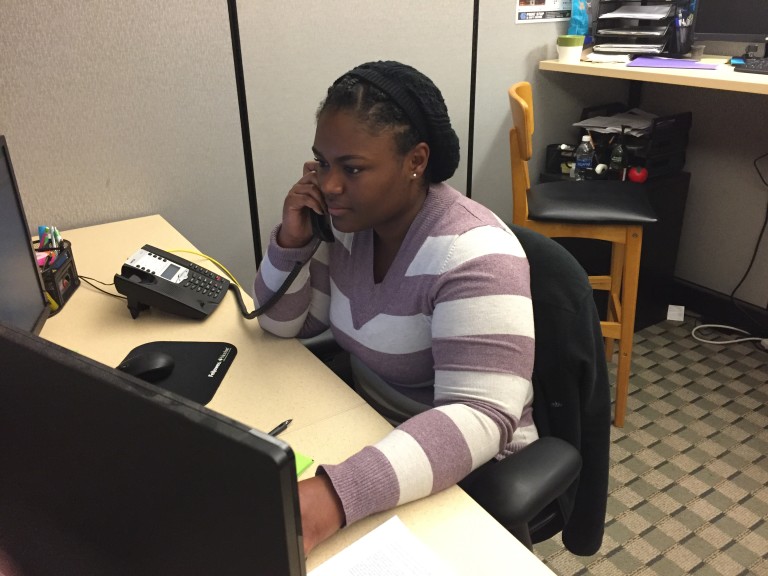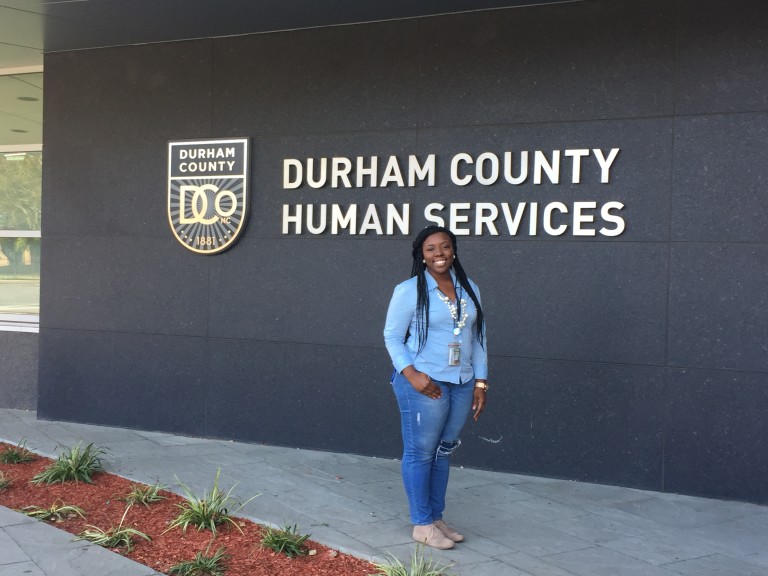Robin Akins remembers receiving a phone call from a patient living with HIV she had been trying to reach for months. Dealing with the sudden loss of a family member had prevented the patient from keeping appointments at the UNC Infectious Diseases (ID) Clinic. Akins works as the clinic’s bridge counselor, ensuring people living with HIV remain in care.


(Republished from the division of infectious diseases website)
“The patient called me and thanked me for all of the reminders about making an appointment to be seen at the ID Clinic,” Akins says. “People’s personal lives are a big barrier to care. That’s why I work hard to communicate with patients and establish a relationship with them.”
Akins’s role in the clinic is part of an effort to keep people living with the virus active in the HIV Care Continuum. This is a model of medical care that includes HIV testing, linkage to care, retention in care, antiretroviral therapy (ART) adherence and viral suppression. When a person living with HIV remains in care and takes their ART daily, their health improves and the likelihood they will pass the virus to another person significantly decreases.
Yet only 48 percent of people living with HIV in the United States are retained in care and only 49 percent have achieved viral suppression, according to the Centers for Disease Control and Prevention (CDC). Bridge counselors strive to increase these numbers by linking people recently diagnosed to care and ensuring those already connected to a provider keep their appointments.
There are many barriers to care. Akins says unstable housing, lack of transportation, loss of medical insurance and distance to the ID Clinic all impact retention. When she makes contact with a patient, she works with them to provide resources to address these obstacles. And her diligence is paying off. In the one year she has been with the ID Clinic, she has re-engaged 1,010 patients.
“I call them every week until they make that follow up appointment,” Akins says. “Most people are grateful for the contact. They have a lot going on in their lives; so sometimes their health falls to the wayside.”
FOCUS Project
Candice Givens is a UNC bridge counselor based at the Durham County Department of Public Health. Her position came as the result of a Gilead FOCUS grant. FOCUS stands for Frontlines of Communities in the United States. The grants support programs to improve testing and linkage to care for people living with HIV and hepatitis C virus (HCV) infection.
The UNC FOCUS project received funding in December of 2015 and due to its success, support for a second year was secured in April 2017. Givens receives referrals from people who test positive for HIV or HCV at the county detention center, social services, or any of the health department’s many clinics including maternal health, adult health and refugee health.
“We had one gentleman who came into social services to check on his Medicaid coverage and he agreed to be screened for hepatitis C virus,” Givens says. “He tested positive and I began working with him to set up a follow up appointment. I built a good rapport with him and he confided that he was also dealing with a cancer diagnosis. I referred him to a social worker, and I let the social worker know what was going on and that he’d need a little extra help. Patients are dealing with a lot of issues at once. I realize that I am helping them and that gives me fuel to keep going because there is so much more to be done.”
Givens uses a combination of phone calls, home visits and mailings to connect with people who are newly diagnosed with HIV or hepatitis C. She uses this same strategy to re-engage people who have been out of care for 90-120 days. Givens says between 15-25 percent of patients are reengaged.
When she does connect with a patient, she completes an assessment with them and, if needed, offers referrals for mental health and substance abuse services. Patients can receive treatment at UNC, Duke or at Lincoln Community Health Center. Since the FOCUS Project began, Givens has linked 405 people with HIV or HCV treatment.
“Since hepatitis C virus is curable, the most exciting part of this project has been helping people get cured,” says FOCUS Project Coordinator Alison Hilton, MPH. “We are engaging people and getting them invested in their own health. I think the FOCUS Project really shows the need for bridge counselors.”